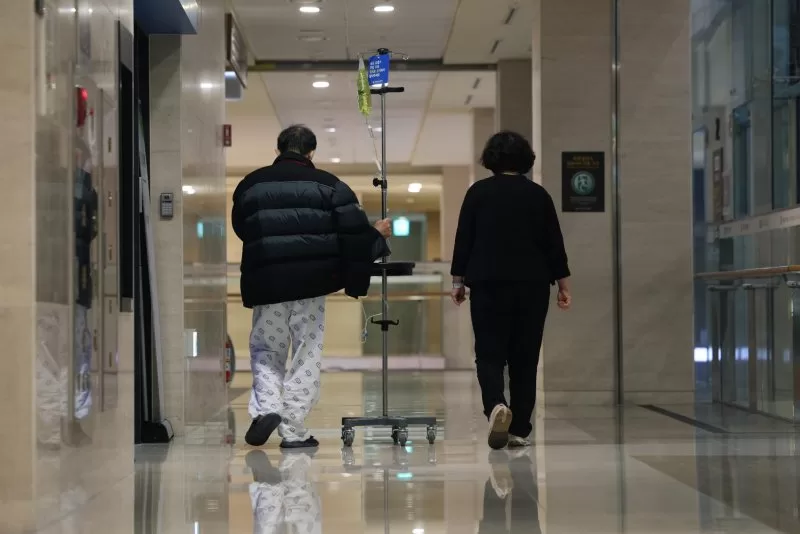South Korea raised its emergency health crisis level to “severe” on Friday, as a walkout by thousands of trainee doctors entered its fourth day. Hospitals have had to delay or cancel surgeries, Seoul’s Health Ministry said. Photo by Yonhap
SEOUL, Feb. 23 (UPI) — The South Korean government raised a health crisis alert to its highest level of “severe” on Friday, as a protest by doctors over medical school admissions has led thousands to walk out on the job for a fourth day.
Some 7,863 trainee doctors — nearly 70% of the trainee total from 94 major hospitals — have walked out as of Thursday evening, causing disruptions in patient care and delays or cancellations of surgeries, Seoul’s Health Ministry said.
Most of the trainee doctors work at the country’s 100 teaching hospitals and play a vital role in assisting with surgeries and emergency services.
At an emergency disaster response meeting Friday, government officials said they would extend operating hours at public hospitals, hire additional temporary medical staff and allow all hospitals and clinics to offer telemedicine services.
“Collective actions that harm the lives and health of the people cannot be justified for any reason,” Prime Minister Han Duck-soo said at the meeting. “We must quickly stabilize the situation and minimize damage to the public through a government-wide response.”
The trainee doctors began their walkout on Tuesday, in protest over a government plan released earlier this month that would admit 2,000 new students to the country’s medical school enrollment quota next year, a significant jump from the current total of just over 3,000 seats.
The move is necessary to address shortages of doctors in essential medical fields and in remote areas, health officials said.
South Korea has 2.6 doctors per 1,000 people, significantly lower than the 3.7 per 1,000 average among Organization for Economic Cooperation and Development countries.
Without any changes to the system, the rapidly aging country will face a shortage of 15,000 healthcare professionals in 2035, South Korea’s Health Ministry claims.
Doctors, however, argue that raising the admissions quota will diminish the quality of medical education. Residents and trainees also say that the government should focus on improving working conditions and raising salaries in lower-paid fields such as pediatrics and emergency care.
“Despite repeated suggestions from the medical circle, the government has been pushing for its own policy measures without ample discussions and consultations,” Lee Pil-soo, head of the Korean Medical Association, said earlier this month.
The KMA, a major lobby group for doctors, has announced plans for large-scale rallies in Seoul on the next two Sundays, the prime minister’s office said.
The doctors have failed to garner much public support so far. A Gallup Korea poll released last week found 76% of respondents are in favor of expanding the medical school quota, with only 16% against the plan.

